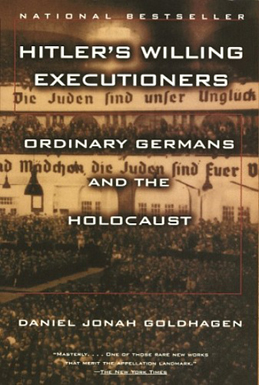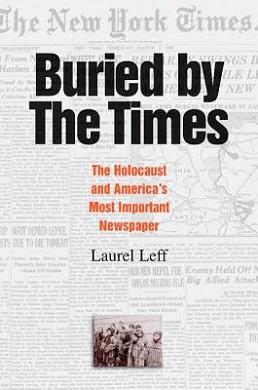
Nicholas Berthelot Lemann is an American writer and academic, and is the Joseph Pulitzer II and Edith Pulitzer Moore Professor of Journalism and Dean Emeritus of the Faculty of Journalism at the Columbia University Graduate School of Journalism. He has been a staff writer at The New Yorker since 1999. Lemann was elected to the American Philosophical Society in 2022.

Julius Streicher was a member of the Nazi Party, the Gauleiter of Franconia and a member of the Reichstag, the national legislature. He was the founder and publisher of the virulently antisemitic newspaper Der Stürmer, which became a central element of the Nazi propaganda machine. The publishing firm was financially very successful and made Streicher a multi-millionaire.
Abraham Michael "Abe" Rosenthal was an American journalist who served as The New York Times executive editor from 1977 to 1986. Previously he was the newspaper's metropolitan editor and managing editor. Following his tenure as executive editor, he became a columnist (1987–1999). Later, he had a column for the New York Daily News (1999–2004).

Joseph Anthony Lewis was an American public intellectual and journalist. He was a two-time winner of the Pulitzer Prize and was a columnist for The New York Times. He is credited with creating the field of legal journalism in the United States.

Edwin Black is an American historian and author, as well as a syndicated columnist, investigative journalist, and weekly talk show host on The Edwin Black Show. He specializes in human rights, the historical interplay between economics and politics in the Middle East, petroleum policy, academic fraud, corporate criminality and abuse, and the financial underpinnings of Nazi Germany.

Lucy Dawidowicz was an American historian and writer. She wrote books about modern Jewish history, in particular, about the Holocaust.
Joseph Salem Lelyveld was an American journalist. He was executive editor of The New York Times from 1994 to 2001, and interim executive editor in 2003 after the resignation of Howell Raines. He was a Pulitzer Prize–winning journalist and author, and a contributor to the New York Review of Books.

Hitler's Willing Executioners: Ordinary Germans and the Holocaust is a 1996 book by American writer Daniel Goldhagen, in which he argues that the vast majority of ordinary Germans were "willing executioners" in the Holocaust because of a unique and virulent "eliminationist antisemitism" in German political culture which had developed in the preceding centuries. Goldhagen argues that eliminationist antisemitism was the cornerstone of German national identity, was unique to Germany, and because of it ordinary German conscripts killed Jews willingly. Goldhagen asserts that this mentality grew out of medieval attitudes rooted in religion and was later secularized.

Jeffrey Mark Goldberg is an American journalist and editor-in-chief of The Atlantic magazine. During his nine years at The Atlantic prior to becoming editor, Goldberg became known for his coverage of foreign affairs. Goldberg became moderator of the PBS program Washington Week in August 2023, while continuing as The Atlantic's editor.
Glenn Frankel is an American author and academic, journalist and winner of the 1989 Pulitzer Prize for International Reporting. He spent 27 years with The Washington Post, where he was bureau chief in Richmond (Va.), Southern Africa, Jerusalem and London, and editor of The Washington PostMagazine. He served as a visiting journalism professor at Stanford University and as Director of the School of Journalism at the University of Texas at Austin. Author of five books, his latest works explore the making of an iconic American movie in the context of the historical era it reflects. In 2018 Frankel was named a Motion Picture Academy Film Scholar. He was named a 2021-2 research fellow of the Leon Levy Center for Biography at the City University of New York for a book about Beatles manager Brian Epstein.

Don David Guttenplan is an American writer who serves as editor of The Nation. A former London correspondent of the magazine, he wrote The Holocaust on Trial, a book about the Irving v Penguin Books and Lipstadt libel case while based in the UK's capital.
Clyde Haberman is an American journalist who has contributed to The New York Times in various capacities since 1977.

Otto David Tolischus was a Prussian-Lithuanian-born journalist for The New York Times and winner of the 1940 Pulitzer Prize for Correspondence for his writing and reporting from Berlin before and during World War II.

Max Wallace is a New York Times-bestselling author and historian specializing in the Holocaust, human rights in sport, and popular culture. He is also an award-winning filmmaker, and long-time disability advocate.

Buried by the Times is a 2005 book by Laurel Leff.

Hubert Renfro Knickerbocker was an American journalist and author; winner of the 1931 Pulitzer Prize for Correspondence for his series of articles on the practical operation of the Five Year Plan in the Soviet Union. He was nicknamed "Red" from the color of his hair.

We Were So Beloved is a 1985 documentary film by Manfred Kirchheimer about Jewish survivors of the Holocaust living in Washington Heights, Manhattan in New York City. It consists of interviews with family and friends interspersed with written and spoken quotes from Mein Kampf to remind the viewer of the evil that had preceded. The film received mixed reviews.
Joyce Purnick is an American columnist and journalist.
Ruth Bettina Birn is a Canadian historian and author whose main field of research is the security forces of Nazi Germany and their role in the Holocaust. For nearly 15 years, she held a position of chief historian in the war crimes section at the Canadian Department of Justice. Birn co-authored A Nation on Trial: The Goldhagen Thesis and Historical Truth with Norman Finkelstein.














